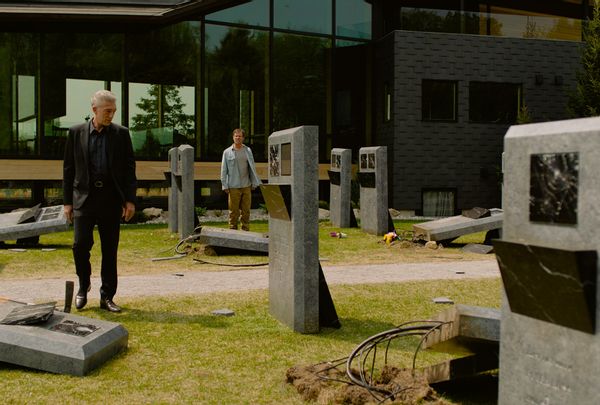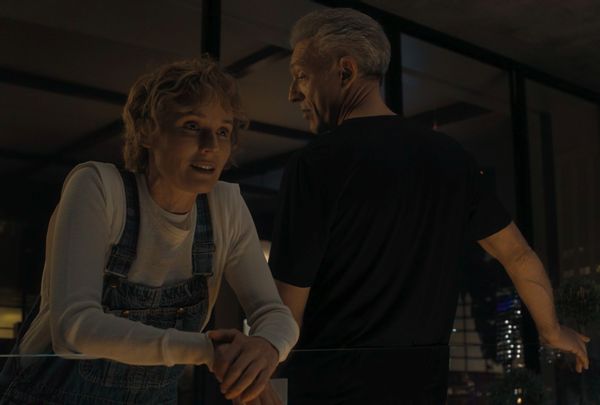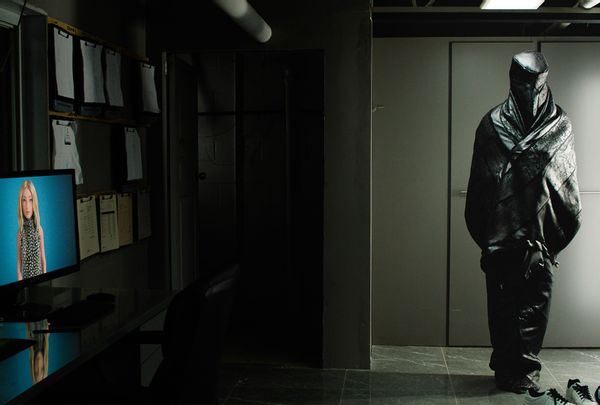With "The Shrouds," cinema's great body horror auteur goes for something a little lighter: grief

There’s something peculiar about the swathes of glowing, yellow celestial fabric that cascade over the opening credits of David Cronenberg’s latest film, “The Shrouds." Initially, these microscopic specks look like little more than space dust floating around the ether until they form almost human shapes. Their silhouette is so familiar it’s almost tangible, as though, if you reached through the screen and ran your hand through it, you’d feel a sensation you recognize and remember. But it would only be a memory.
Just as soon as viewers have settled into his ambient galactic atmosphere, the masterful auteur Cronenberg yanks us out and puts us into the literal mouth of Karsh (Vincent Cassel), a tech entrepreneur who’s at the dentist for a checkup. “Grief is rotting your teeth,” the dentist tells him. After spending time in the divine abyss, we’re back in reality, ripped from the stratosphere and placed into one of life’s most mundane torments: the hygienist’s chair. It’s a jarring, distinctly funny transition, one you might not initially expect from one of Cronenberg’s most personal films. “The Shrouds” is a meditation on grief, born from the passing of the director’s wife, Carolyn Zeifman, in 2017. And though the film is heavy, laden with reflections on the crushing indignity of surviving a loved one’s death, it’s also genuinely hilarious. Just like those specks of celestial dust that begin to look like human shapes, “The Shrouds” is not exactly what it first appears to be.
Though Cronenberg arrives at no formal solutions, his approach to the enigma of death feels more potently human than any grief allegory in recent years, simply because he’s unafraid to laugh and cry at the same time.
The film is both funny and achingly sad; difficult to get a handle on, as grief so often is. Cronenberg probes this dichotomy throughout the film, weaving humor and sorrow together to create the proprietary fabric he uses to construct the titular mourning garment — a funeral shroud reinvented for the digital age that lets people peek in on the dead for the right price. At the whims of his grief, Cronenberg succumbs to feeling, resisting the popular urge to mold grief into an allegory for horror. Over the last decade, especially, there has been no shortage of films that have tried something similar, and to varying success. Too often, the desire to unnerve audiences takes priority, resulting in the metaphor being muddled between jump scares and gore. When working in the context of something like grief, which is both universal and completely personal, too many filmmakers prioritize the former, opting for digestible entertainment and robbing grief of its teeth. How fitting, then, that grief is rotting Karsh’s teeth right out of his head.
In “The Shrouds,” Cronenberg has no desire to figure his grief out, much less turn it into a horror show. That’s not to say he shies away from the pain, only that he’s far more eager to take a different route than most, inspecting the uniquely funny ways that grief can affect and control our lives. Here, he’s done that in the most Cronenbergian of ways, honing in on eccentric characters who feel their emotions with their entire bodies. Their mourning has made them vessels who exist in service of their sadness, called to sheer absurdity as a means of dealing with the injustice of death. “What do I do about this grief thing?” Karsh asks the dentist as he pokes around at his teeth. Through Karsh, Cronenberg spends the rest of the film trying to figure that out. And though he arrives at no formal solutions, Cronenberg’s approach to the enigma of death feels more potently human than any grief allegory in recent years, simply because he’s unafraid to laugh and cry at the same time.
After Cronenberg’s previous film, 2022’s “Crimes of the Future,” went to great lengths to investigate the malleability of the human body, “The Shrouds” turns inward, focusing primarily on the mind and how seismic loss alters the way we think about ourselves and the world we live in. For Karsh, a former producer of industrial videos turned technology magnate, the loss of his wife Becca (Diane Kruger) proved she was an inextricable part of his existence, so tied to his happiness that he couldn’t bear to live without her. He describes watching her casket being lowered into the ground and feeling the overwhelming desire to jump into the hole to descend into the grave with her. “It wasn’t a literary or intellectual thing,” he says. “It was right here, pulling me.”
 Vincent Cassel as Karsh and Guy Pearce as Maury in "The Shrouds" (Courtesy of Prospero Pictures/Saint Laurent Productions)
Vincent Cassel as Karsh and Guy Pearce as Maury in "The Shrouds" (Courtesy of Prospero Pictures/Saint Laurent Productions)
Karsh describes this sensation to his date, Myrna (Jennifer Dale), while sitting in a restaurant adorned with intimidating black cloaks. These cloaks are the shrouds, high-tech burial wrappings that allow a corpse to be scanned and modeled in a 3D image, ready to be viewed at any time in the GraveTech app — for a hefty sum, of course. Karsh co-created GraveTech, and he’s a part-owner in the restaurant the couple is dining in, which sits on the grounds of the GraveTech cemetery. Myrna confesses that she finds the whole situation a bit strange, but she’s curious about the man sitting in front of her. He’s puzzling yet almost frighteningly straightforward. She’s intimidated by him and his intense love for the late Becca, but even her hesitation doesn’t prevent her from agreeing to see what Karsh’s tech is capable of.
Want a daily wrap-up of all the news and commentary Salon has to offer? Subscribe to our morning newsletter, Crash Course.
Myrna expects that the screens on the tombstones in the cemetery will display a slideshow or digital photograph of the deceased loved one, perhaps a better method than cultures that paste or carve the image of their departed onto the grave. But when Karsh pulls up the handy dandy GraveTech app, she gets more than she bargained for: A front-row seat to Becca’s decomposing body, six feet underground. Cronenberg wisely lingers on this unexpected image without immediately cutting to Myrna’s reaction, a technique he repeats throughout “The Shrouds.” He lets the viewer take in the strange horror onscreen and the full insanity of it, at the same pace anyone would. When he finally cuts back to Myrna’s shock, it makes Karsh’s follow-up line even funnier. “The classic wide-angle view!” he says with a grin, proudly showing off the stream of Becca’s decaying cadaver glowing from his phone screen.
It’s a cackle-worthy bit of dialogue, thrown out of nowhere so Cronenberg can establish a baseline for the film’s silliness. Here is this ostensibly brilliant, devilishly handsome, debonair man, touting his biotech voyeurism like he’s a kid showing off a painting he made in art class. After Becca’s death, Karsh has fallen completely out of touch with reality. One has to wonder what a man with his resources might do if he hadn’t landed on the GraveTech app. “It has drained away that fluid of grief that was drowning me, killing me,” he tells Myrna, who politely declines his invitation for a second date.
 Diane Kruger and Vincent Cassel in "The Shrouds" (Courtesy of Janus Films)
Diane Kruger and Vincent Cassel in "The Shrouds" (Courtesy of Janus Films)
Early on, Cronenberg begins to juggle some fascinating ideas about our varied responses to grief, and in turn, the different forms grief can take. For Karsh, the loss of Becca was so totally consuming that it threatened to eat him alive, driving him to a kind of high-functioning, tech-forward lunacy. (It doesn’t seem like a coincidence that Cronenberg depicts him as a Tesla-driving conspiracist as the film goes on.) His approach to handling that grief might be strange, but is it so unrealistic that someone would go to such lengths to see their loved one again, even if in the most digitally distorted way possible?
In “The Shrouds,” we’re witness to a more realistic depiction of grieving than most filmmakers allow us. The pain isn’t buried beneath gore or jump scares, it’s all out in the open. Like any visible wound, it’s hard to look at, but there’s no use in trying to turn away or cover your eyes. The agony will be there when you look back.
For Karsh, GraveTech is an art; it makes his love mean something. And for Cronenberg, “The Shrouds” is not dissimilar. It’s a film that tries to find meaning in despair, a significance that goes beyond the adage that the sadness that lingers after something is gone is a sign that you loved that thing while it was here. Death can’t just be the end, not for Cronenberg or Karsh. When you really think about it, isn’t the sheer refusal to accept something as mortal as death, that we see coming for our entire lives, just the slightest bit absurd?
Cronenberg understands that. He’s making a movie about the subject, after all. And he transmits the inanity to his characters, who speak, move and act as if they are all part of a stage play that would get laughed off Broadway before previews have even ended. As Karsh, Cassel is ludicrous, speaking English in his heavy French accent in a movie set in the middle of Toronto. If it weren’t for the voice, one would clock him as a dead ringer (pun intended) for Cronenberg himself, one who slots perfectly into the director’s signature left-of-center atmosphere. And then there’s Becca’s twin sister, Terry, also played by Kruger, a shaggy-haired dog groomer with an insatiable lust for conspiracy. The two of them feed off each other’s mounting discontent with life in the wake of Becca’s death. Eventually, Terry and Karsh begin to wonder if having sex will bring them closer to Becca in some twisted way.
 "The Shrouds" (Courtesy of Janus Films)Then — gasp — GraveTech is vandalized, and Karsh’s proximity to his beloved wife via 24/7 livestream is taken from him. He begins having dreams about Becca, returning nude to their bedroom every night, each time with new scars or limbs missing. Quickly, Karsh’s love turns to possessiveness, and everyone around him becomes a suspect. That includes Terry’s ex, Maury (Guy Pearce), and Karsh’s AI avatar called Hunny (Kruger in a voice-only role), who kicks “The Shrouds” up to a new level of off-putting, sardonic comedy. Hunny pops in and out of the film, her crudely animated, blonde image the lovechild of Siri and Samantha Jones. When she appears to Karsh to deliver some bad news as a koala bear, he politely asks her to stop playing around. She obliges his request and turns back to a human avatar before adding, “I’m feeling a bit chilly without my fur coat!”
"The Shrouds" (Courtesy of Janus Films)Then — gasp — GraveTech is vandalized, and Karsh’s proximity to his beloved wife via 24/7 livestream is taken from him. He begins having dreams about Becca, returning nude to their bedroom every night, each time with new scars or limbs missing. Quickly, Karsh’s love turns to possessiveness, and everyone around him becomes a suspect. That includes Terry’s ex, Maury (Guy Pearce), and Karsh’s AI avatar called Hunny (Kruger in a voice-only role), who kicks “The Shrouds” up to a new level of off-putting, sardonic comedy. Hunny pops in and out of the film, her crudely animated, blonde image the lovechild of Siri and Samantha Jones. When she appears to Karsh to deliver some bad news as a koala bear, he politely asks her to stop playing around. She obliges his request and turns back to a human avatar before adding, “I’m feeling a bit chilly without my fur coat!”
Cronenberg’s film pushes the boundaries of its ridiculousness to an almost uncomfortable place. Aren’t we supposed to be watching a movie about grief here? Yes, we are, and that’s precisely what conjures this discomfort. In “The Shrouds,” we’re witness to a more realistic depiction of grieving than most filmmakers allow us. The pain isn’t buried beneath gore or jump scares, it’s all out in the open. Like any visible wound, it’s hard to look at, but there’s no use in trying to turn away or cover your eyes. The agony will be there when you look back. And it will eat you alive if you’re not willing to give it at least one honest look. Karsh’s life is thrown out of whack by the sheer horror of losing the love of his life, leaving him alone in this world, vulnerable and in need. He is emotionally weakened to the point of subservience — to tech, to conspiracy, and humor; anything that will restore some meaning. He’s a man riddled with contradicting views and tones, as is “The Shrouds.” There is no containing death, no trapping the memory of someone in an app on your phone. Death will always be a force more powerful than us. It’s funny that we could ever be so arrogant to think otherwise.
"The Shrouds" is in theaters in New York and Los Angeles and expands nationwide April 25.
salon





